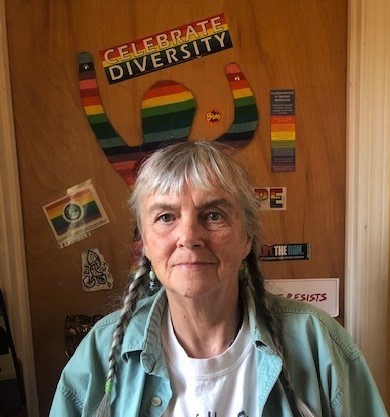Guest Author: Julia Cochrane
 I was one of QUUF’s delegates to the Unitarian Universalist Association’s 2021 annual national meeting which is called the General Assembly. Besides attending all the business meetings as a delegate, I also attended a smattering of events and workshops, and am listening to more after the fact, which is a benefit of everything being virtual and recorded!
I was one of QUUF’s delegates to the Unitarian Universalist Association’s 2021 annual national meeting which is called the General Assembly. Besides attending all the business meetings as a delegate, I also attended a smattering of events and workshops, and am listening to more after the fact, which is a benefit of everything being virtual and recorded!
Today I want to tell you about Allies for Racial Equity’s workshop called “Praxis in the Borderlands: Solidarity vs Charity”. Praxis means practice. How do we practice solidarity? How do we go from Allies to Co-conspirators? As an ally, am I willing to be arrested or harmed? Am I ready to put my life and liberty on the line for your rights? Can I support your quest to go beyond surviving to actually thrive?
Three videos were part of this workshop. The first one you can find on YouTube. It is called 39 Cents – SNL. It is a sarcastic look at charity that is based on what is an academic estimate for a person’s survival, such as pledging 39 cents a day to give some foreign third world nation clean water. This is the kind of process that has decided a family of three in Washington State can survive on $569 per month. In the video the people who were the charity cases question why 39 cents a day rather than 99 cents a day or any other amount. They grow in their understanding that it’s intentional to keep them surviving in poverty – not to actually allow them to thrive and become more.
The second video is about being a co-conspirator or accomplice rather than an ally. You are challenged, “When my existence itself is criminalized, I need you to actually commit a crime… Put your body in the way of pepper spray and rubber bullets.” Accomplices take risks.
The third video, Undocujoy, was actually delightful as it combats victimizing representations of people who are undocumented with authentic images of happiness. Even the most downtrodden have joy in their lives. Joy is a necessary ingredient to life. It also is part of empathy and without empathy and empathetic joy, we are back to patronizing demeaning charity.
As I walk in the world of the un-sheltered, I see flickers of joy. I know that I will stand in the front line if intentional harm goes towards them. If they are criminalized in the acts of meeting their most basic needs then, yes, I am an accomplice. I will set up a tent in front of theirs. I am willing to join the ranks of vagrants if vagrancy is illegal.
If you are an ally to a marginalized population, how far are you willing to go to secure their basic rights and join them on the path to thriving? This is a basic question for all people in a faith tradition. How much do you actually love your neighbor?

Liked the report. Good reminders of what is needed to be an ally. I plan to check out the links.
Julia, it is so easy to feel satisfied as an “ally” from afar. Thank you for the challenge.
Julia, thank you! I didn’t attend that workshop and really appreciate your telling us about it. Next week I’ll write about Stacey Abrams’ lecture. I was so impressed that she characterized the attitude of the marginalized with whom she works as “prayerful and hopeful.”
Julia, thank you for your helpful report on your experience at the General assembly. Particularly liked your comments in your blog when you say without empathy and empathetic joy we are back to patronizing charity.
Yes, that’s my favorite part too. Thanks for sharing Julia!